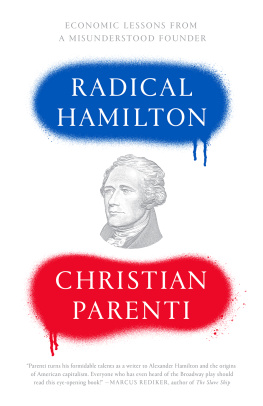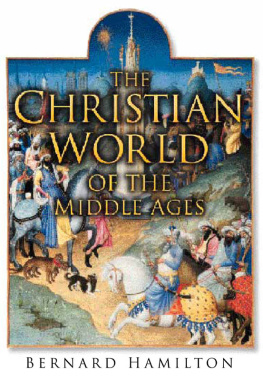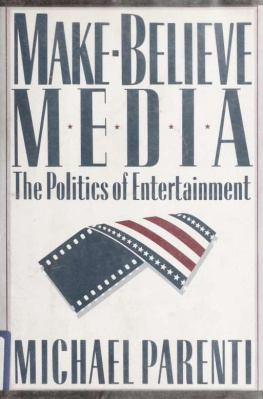Christian Parenti - Radical Hamilton: Economic Lessons from a Misunderstood Founder
Here you can read online Christian Parenti - Radical Hamilton: Economic Lessons from a Misunderstood Founder full text of the book (entire story) in english for free. Download pdf and epub, get meaning, cover and reviews about this ebook. year: 2020, publisher: Verso Books, genre: Politics. Description of the work, (preface) as well as reviews are available. Best literature library LitArk.com created for fans of good reading and offers a wide selection of genres:
Romance novel
Science fiction
Adventure
Detective
Science
History
Home and family
Prose
Art
Politics
Computer
Non-fiction
Religion
Business
Children
Humor
Choose a favorite category and find really read worthwhile books. Enjoy immersion in the world of imagination, feel the emotions of the characters or learn something new for yourself, make an fascinating discovery.
- Book:Radical Hamilton: Economic Lessons from a Misunderstood Founder
- Author:
- Publisher:Verso Books
- Genre:
- Year:2020
- Rating:5 / 5
- Favourites:Add to favourites
- Your mark:
- 100
- 1
- 2
- 3
- 4
- 5
Radical Hamilton: Economic Lessons from a Misunderstood Founder: summary, description and annotation
We offer to read an annotation, description, summary or preface (depends on what the author of the book "Radical Hamilton: Economic Lessons from a Misunderstood Founder" wrote himself). If you haven't found the necessary information about the book — write in the comments, we will try to find it.
Radical Hamilton: Economic Lessons from a Misunderstood Founder — read online for free the complete book (whole text) full work
Below is the text of the book, divided by pages. System saving the place of the last page read, allows you to conveniently read the book "Radical Hamilton: Economic Lessons from a Misunderstood Founder" online for free, without having to search again every time where you left off. Put a bookmark, and you can go to the page where you finished reading at any time.
Font size:
Interval:
Bookmark:

Radical Hamilton
Radical Hamilton
Economic Lessons from a
Misunderstood Founder
Christian Parenti

First published by Verso 2020
Christian Parenti 2020
All rights reserved
The moral rights of the author have been asserted
1 3 5 7 9 10 8 6 4 2
Verso
UK: 6 Meard Street, London W1F 0EG
US: 20 Jay Street, Suite 1010, Brooklyn, NY 11201
versobooks.com
Verso is the imprint of New Left Books
ISBN-13: 978-1-78663-392-7
ISBN-13: 978-1-78663-393-4 (US EBK)
ISBN-13: 978-1-78663-391-0 (UK EBK)
British Library Cataloguing in Publication Data
A catalogue record for this book is available from the British Library
Library of Congress Cataloging-in-Publication Data
Names: Parenti, Christian, author.
Title: Radical Hamilton : economic lessons from a misunderstood founder / Christian Parenti.
Other titles: Economic lessons from a misunderstood founder
Description: First edition hardback. | London ; Brooklyn : Verso Books, [2020] | Includes bibliographical references and index. | Summary: This book explains Hamiltons radical ideas in the context of his revolutionary times and in contrast to other revolutionaries, such as Thomas Jefferson, who emerges as the epitome of rural, slave-owning, anti-statist thinkers. This is a book of scholarship, with hundreds of notes and explanations of early American economics and history, but written in a stylish, accessible, narrative style befitting a leading, longtime journalistProvided by publisher.
Identifiers: LCCN 2020008282 (print) | LCCN 2020008283 (ebook) | ISBN 9781786633927 (hardback) | ISBN 9781786633934 (ebk)
Subjects: LCSH: Hamilton, Alexander, 17571804. | United StatesPolitics and government17831809. | United StatesEconomic conditionsTo 1865. | Hamilton, Alexander, 17571804. Report on the subject of manufactures. | StatesmenUnited StatesBiography.
Classification: LCC E302.6.H2 P265 2020 (print) | LCC E302.6.H2 (ebook) | DDC 973.4092 [B]dc23
LC record available at https://lccn.loc.gov/2020008282
LC ebook record available at https://lccn.loc.gov/2020008283
Typeset in Sabon by MJ & N Gavan, Truro, Cornwall
Printed in the UK by CPI Group (UK) Lrd, Croydon CR0 4YY
Dedicated to my father, Michael Parenti.
The bit of truth behind all this one so eagerly denied is that men are not gentle, friendly creatures wishing for love, who simply defend themselves if they are attacked, but that a powerful measure of desire for aggression has to be reckoned as part of their instinctual endowment. The result is that their neighbour is to them not only a possible helper or sexual object, but also a temptation to them to gratify their aggressiveness on him, to exploit his capacity for work without recompense, to use him sexually without his consent, to seize his possessions, to humiliate him, to cause him pain, to torture and kill him.
Sigmund Freud, Civilization and Its Discontents,
And now, I think, the meaning of the evolution of civilization is no longer obscure to us. It must present the struggle between Eros and Death, between the instinct of life and the instinct of destruction, as it works itself out in the human species. This struggle is what all life essentially consists of, and the evolution of civilization may therefore be simply described as the struggle for life of the human species.
Sigmund Freud, Civilization and Its Discontents,
T he modern United States has a strange relationship with Alexander Hamilton. Sometimes he is seen as the bad boy of the founding fathers, because of his authoritarian political tendencies. He is portrayed as the patron saint of bankers, because he saw the importance of banks and created our financial system. As a person he was a contradictory mix: a tough soldier, austere workaholic, exacting bureaucrat, yet also a sexual libertine who probably had at least one male lover, and a glory-obsessed romantic with pronounced suicidal tendencies. For much of the twentieth century, Hamilton was out of fashion, while his rival Thomas Jefferson, the patrician democrat and slave owner who feared government overreach, was claimed by all. But more recently, Hamilton has become hip.
Yet Americans still ignore Hamiltons dirigiste economic theory. We take our Hamilton la carte. We recognize him as the architect of our financial system, but we ignore what he wrote about the real economy in which goods and services are actually produced and consumed. We recognize him as a key author of the American Constitution and thus of the modern American state, but we never connect his theory of state to his full theory of economic development.
In particular, Hamiltons magnum opus, his 1791 Report on the Subject of Manufactures, a central focus of this book, is almost totally ignored by economists, historians, development specialists, and biographers. Hamiltons statist political economy is all there in print, yet most recent literature on Hamilton shies away from addressing his profoundly statist economic ideas. The Report is occasionally name-checked but almost never read, taught in college courses, or publicly discussed in any detail.
In his otherwise highly readable biography of Hamilton, Ron Chernow devotes only four pages to the Report. Chernows lines feel correct to the modern ear: In the best of all possible worlds, Hamilton preferred free trade, open markets, and Adam Smiths invisible hand. Hamilton was, he says, reluctant to tinker with markets. But that is not correct.
In reality, Hamilton sought to create a national market from thirteen semi-integrated pieces and then transition that national economy from a lopsided dependence on export agriculture to a balanced and diversified economy centered on manufacturing. In the Report Hamilton lists, in meticulous detail, exactly how government should not merely tinker with but fundamentally overhaul, and create from the ground up, whole markets. His set of tools was labeled with a phrase that should be famous: the Means proper. These included carefully targeted state subsidies; protective tariffs; strategic exemptions from the same tariffs; selective export bans of strategic raw materials; quality-control standards and inspections; public investment in infrastructure; research and development; recruitment of skilled labor, and other measures that are detailed later. Hamiltons means proper were the tools of economic planning, and their presentation in the Report on Manufactures was not merely a list, but also a blueprint for the orchestration and execution of a grand national plan aimed at nothing less than fundamental economic transformation. Asserting, as many do, that Hamilton was deep down a free marketeer serves to elide the progressive and immediately useful elements in Hamiltons thinking.
Similarly, Richard Brookshire, an editor at National Review, in his recent Hamilton biography spends only six pages on the Report, during which he mostly ignores Hamiltons advocacy of government intervention. Instead, he focuses on those portions The PBS American Experience documentary on Hamilton devotes one line, or about six seconds out of an hour and a half, to Hamiltons statist and developmentalist policies. Even then the documentary dismisses as sinister and strange Hamiltons flirtation with the idea of public ownership.
Font size:
Interval:
Bookmark:
Similar books «Radical Hamilton: Economic Lessons from a Misunderstood Founder»
Look at similar books to Radical Hamilton: Economic Lessons from a Misunderstood Founder. We have selected literature similar in name and meaning in the hope of providing readers with more options to find new, interesting, not yet read works.
Discussion, reviews of the book Radical Hamilton: Economic Lessons from a Misunderstood Founder and just readers' own opinions. Leave your comments, write what you think about the work, its meaning or the main characters. Specify what exactly you liked and what you didn't like, and why you think so.












